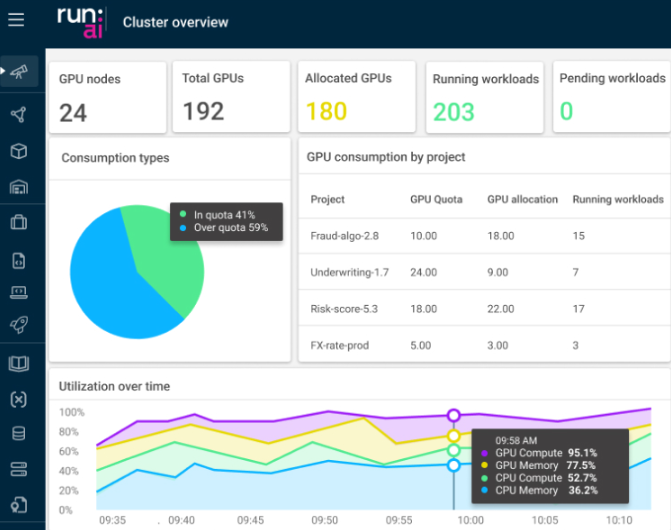 AI
AI
 AI
AI
 AI
AI
Nvidia Corp. is reportedly holding talks to acquire a startup called Run:ai Labs Ltd., which has built a novel virtualization infrastructure to accelerate artificial intelligence training.
Calcalist, which first reported the news, said the deal could ultimately be worth many hundreds of millions of dollars, and could even be as high as $1 billion. The companies didn’t respond to the publication’s inquiries.
Run:ai is well-funded, having most recently closed on a $75 million Series C round of funding in March 2022, led by Tiger Global Management and Insight Partners. Prior to that, it raised $30 million in a January 2021 Series A round, which followed its launch back in April 2019.
The startup was launched by its Chief Executive Omri Geller and Chief Technology Officer Ronen Dar in 2018. The two co-founders reportedly met while studying at Tel Aviv University’s Faculty of Electrical Engineering. They established Run:ai after developing a novel orchestration and virtualization software layer that’s tailored to the unique needs of AI workloads running on graphics processing units and other AI accelerators.
Run:ai’s Kubernetes-based container platform for AI clouds works by efficiently pooling and sharing GPU resources, automatically assigning the necessary amount of compute for each workload, which could be as little as a fraction of a GPU, all the way up to multiple clusters of GPUs.
The company has built a virtualization layer for deep learning workloads that can train AI models on GPUs much more rapidly than is otherwise possible, while using fewer resources. Deep learning is a subset of AI that attempts to mimic roughly the workings of the human brain, enabling technologies such as image recognition, autonomous driving, smart assistants and more.
According to Run:ai, it was the first and only company in the world to marry the concept of operating system-level virtualization with AI workloads based on GPUs. It said it was inspired by traditional virtualization, which brought better management to central processing units, revolutionizing the computing industry back in the 1990s. Its AI virtualization infrastructure works similarly to, pooling the resources of large GPU clusters so they can be shared more efficiently among multiple AI workloads.
“We do for AI hardware what VMware and virtualization did for traditional computing,” Dar said two years ago when the company closed on its Series B funding round.
Run:ai also offers a compute abstraction layer that leverages graph-based parallel computing algorithms to analyze deep learning models and break them down into smaller components. Then it can train each of these different parts in parallel, thereby reducing the time it takes to complete the entire training process. This abstraction layer also helps to overcome the limitations of GPU’s random-access memory, meaning bigger and more complex models can be trained on fewer resources.

.
Although best known for its powerful GPUs, Nvidia is also a key player in the AI development industry, with its Nvidia AI Enterprise platform providing a comprehensive set of tools for developers to get started building their own models, or fine-tuning and customizing existing large language models.
News of Nvidia’s interest in acquiring Run:ai comes on the same day that the AI infrastructure startup revealed that its software has achieved Nvidia DGX SuperPOD certification. The announcement certifies that Run:ai’s advanced workload management software will run efficiently on Nvidia’s powerful AI supercomputing platform, helping customers to accommodate even the largest of generative AI models.
Should the deal between Nvidia and Run:ai go ahead, it would be the chipmaker’s first acquisition of an Israeli company since March 2019, when it paid a huge $6.9 billion to acquire the networking startup Mellanox.
Nvidia has just kicked off its annual GTC developer conference, where it unveiled its most powerful GPU architecture yet, called Blackwell. It also announced a new initiative called Project GR00T, which is a foundational AI model for humanoid robots.
The surge of interest in AI that was ignited by the debut of ChatGPT in late 2022 has helped Nvidia to emerge as one of the world’s richest companies. An AI-induced rally has seen Nvidia’s total market capitalization rise from less than $1 trillion to more than $2 trillion in just nine months, overtaking Amazon.com Inc. and Google LLC’s parent Alphabet Inc. to become the world’s third most valuable company after Apple Inc. and Microsoft Corp.
Nvidia is believed to control more than 80% of the market for high-end AI chips and accelerators.
Support our open free content by sharing and engaging with our content and community.
Where Technology Leaders Connect, Share Intelligence & Create Opportunities
SiliconANGLE Media is a recognized leader in digital media innovation serving innovative audiences and brands, bringing together cutting-edge technology, influential content, strategic insights and real-time audience engagement. As the parent company of SiliconANGLE, theCUBE Network, theCUBE Research, CUBE365, theCUBE AI and theCUBE SuperStudios — such as those established in Silicon Valley and the New York Stock Exchange (NYSE) — SiliconANGLE Media operates at the intersection of media, technology, and AI. .
Founded by tech visionaries John Furrier and Dave Vellante, SiliconANGLE Media has built a powerful ecosystem of industry-leading digital media brands, with a reach of 15+ million elite tech professionals. The company’s new, proprietary theCUBE AI Video cloud is breaking ground in audience interaction, leveraging theCUBEai.com neural network to help technology companies make data-driven decisions and stay at the forefront of industry conversations.